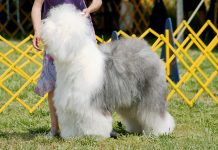History and Origins of the English Pointer Breed

The English Pointer’s history dates back several centuries, with roots tracing to 17th century England. The breed was developed as a dedicated bird-hunting dog, specifically for pointing and retrieving gamebirds such as quail, pheasant, and grouse. English Pointer ancestors likely include Spanish Pointers, Foxhounds, and various setting spaniels, resulting in the breed’s distinctive appearance and hunting instincts.
The modern English Pointer as we know it today was refined in England during the 18th and 19th centuries. Breeders focused on enhancing the breed’s pointing abilities, stamina, and endurance in the field. English Pointers gained popularity among hunters for their exceptional scenting skills, speed, and grace while on the hunt.
The breed was officially recognized by the Kennel Club in England in the mid-19th century and later by the American Kennel Club (AKC) in 1884. English Pointers quickly gained a reputation as one of the finest bird dogs, prized for their efficiency in locating and indicating game to hunters.
Physical Characteristics and Appearance of English Pointers
The English Pointer is a medium to large-sized breed with a distinctive, athletic appearance suited for fieldwork. Here are the key physical characteristics and appearance traits of the English Pointer:
- Size: English Pointers are medium to large-sized dogs. Adult males typically stand between 25 to 28 inches (63 to 71 cm) at the shoulder, while females are slightly smaller, ranging from 23 to 26 inches (58 to 66 cm). They usually weigh between 45 to 75 pounds (20 to 34 kg).
- Coat: The English Pointer has a short, dense coat that lies close to the skin and provides protection from the elements. The coat is smooth and sleek, requiring minimal grooming to maintain.
- Color: English Pointers come in various colors, including liver, lemon, orange, black, and combinations of these colors with white. The coat may be solid, patched, or speckled, with distinct markings that enhance the breed’s visibility in the field.
- Head: The breed’s head is refined and well-proportioned, with a slightly rounded skull and a well-defined stop. English Pointers have expressive dark eyes that convey intelligence and attentiveness. The ears are set high on the head and hang close to the cheeks.
- Body: English Pointers have a muscular and athletic build, with a deep chest and strong, sloping shoulders that allow for powerful movement and endurance. The back is strong and level, leading to a graceful tail set that is carried straight or slightly curved.
- Gait: English Pointers move with a smooth, ground-covering gait that reflects their agility and stamina in the field. Their movement is effortless and efficient, with a purposeful stride.
- Expression: English Pointers have a friendly and alert expression, reflecting their keen hunting instincts and sociable nature.
Overall, the English Pointer is a well-balanced and elegant breed with a distinctive appearance tailored for its role as a versatile hunting dog. Their combination of athleticism, intelligence, and sociability makes them excellent companions for active individuals and families who appreciate outdoor pursuits.
Understanding the history and physical characteristics of the English Pointer highlights the breed’s remarkable evolution and enduring qualities as a beloved hunting partner and loyal family member. With proper care, training, and exercise, English Pointers thrive in a variety of environments and excel in their natural role as skilled bird dogs.
English Pointer Temperament and Personality Traits
The English Pointer is renowned for its friendly demeanor, intelligence, and strong hunting instincts. This breed possesses a unique combination of traits that make it an excellent hunting companion and beloved family pet. Here are the key temperament and personality traits of the English Pointer:
- Friendly and Sociable: English Pointers are affectionate and enjoy being part of the family. They are friendly towards people, including children, and generally get along well with other dogs and pets. This breed thrives on companionship and forms strong bonds with their owners.
- Energetic and Active: English Pointers are highly energetic dogs with boundless stamina. They require plenty of physical exercise and mental stimulation to stay happy and healthy. This breed excels in activities like running, hiking, and playing fetch.
- Intelligent and Trainable: English Pointers are intelligent dogs that respond well to training. They are eager to please their owners and excel in obedience training, agility, and other canine sports. Positive reinforcement methods work best with this breed.
- Alert and Curious: English Pointers have a keen sense of smell and are naturally curious. They enjoy exploring their surroundings and have a strong instinct to hunt and track game. Early socialization helps channel their natural instincts appropriately.
- Gentle and Affectionate: Despite their hunting prowess, English Pointers are gentle and affectionate dogs. They form close bonds with their families and thrive on affection and attention.
- Playful and Eager: English Pointers retain their puppy-like playfulness well into adulthood. They love interactive games and toys that engage their minds and bodies. Regular playtime is essential to keep them mentally stimulated.
- Good Watchdogs: English Pointers are alert and will bark to alert their owners to unfamiliar sounds or visitors. However, they are not typically aggressive and may greet strangers with enthusiasm once properly introduced.
- Hunting Instincts: English Pointers have strong hunting instincts, including pointing and retrieving. They excel in the field and are valued for their ability to locate and indicate gamebirds to hunters.
- Adaptable: With proper exercise and training, English Pointers can adapt to various living situations, from suburban homes with active families to rural settings with ample outdoor space.
Training and Socialization Needs for English Pointers
Training and socialization are essential for English Pointers to become well-mannered companions and confident individuals. Here are some tips for training and socializing your English Pointer:
- Start Early: Begin training and socialization as soon as you bring your English Pointer puppy home. Early exposure to different people, animals, environments, and experiences helps build confidence and prevent behavioral issues later on.
- Positive Reinforcement: Use positive reinforcement techniques such as treats, praise, and play to motivate and reward your English Pointer during training sessions. They respond well to gentle, consistent, and patient training methods.
- Obedience Training: Teach basic commands like sit, stay, come, and heel. English Pointers are intelligent and eager to please, making them quick learners. Use training sessions to stimulate their minds and build a strong bond with them.
- Exercise Needs: Provide ample daily exercise to satisfy your English Pointer’s high energy levels. Engage in activities like brisk walks, runs, hikes, and interactive games to keep them physically and mentally stimulated. Lack of exercise can lead to boredom and destructive behaviors.
- Socialization: Expose your English Pointer to different people, including children, adults, and strangers. Also, introduce them to other dogs and animals in a controlled and positive manner. Early socialization helps prevent shyness, fearfulness, or aggression towards unfamiliar situations.
- Consistency: Be consistent in your training approach and expectations. Set clear rules and boundaries for behavior and enforce them consistently. English Pointers thrive with structure and routine.
- Patience and Persistence: English Pointers may have a stubborn streak, so patience and persistence are key when training. Keep training sessions short, positive, and engaging to maintain their interest.
- Channel Hunting Instincts: Engage your English Pointer in activities that stimulate their natural hunting instincts, such as scent work, retrieving games, and puzzle toys. This helps satisfy their innate drive and provides mental enrichment.
By investing time and effort in training and socialization, you can help your English Pointer become a well-rounded, well-behaved companion. Consistent training, positive reinforcement, and plenty of exercise and mental stimulation are essential for bringing out the best in this intelligent and energetic breed.
Health Considerations and Common Issues in English Pointers
English Pointers are generally healthy dogs with a lifespan of around 12 to 15 years. However, like all breeds, they may be prone to certain health conditions. Responsible breeding practices and regular veterinary care can help minimize the risk of these issues. Here are some common health considerations and issues in English Pointers:
- Hip Dysplasia: This is a hereditary condition where the hip joint doesn’t develop properly, leading to arthritis and lameness. Responsible breeders screen their breeding stock for hip dysplasia to reduce its incidence in puppies. Weight management and appropriate exercise can also help manage hip dysplasia.
- Elbow Dysplasia: Similar to hip dysplasia, elbow dysplasia is a developmental condition affecting the elbow joint. It can cause lameness and discomfort, particularly in active dogs like English Pointers. Early diagnosis and appropriate management are essential.
- Hypothyroidism: English Pointers may be prone to hypothyroidism, a condition where the thyroid gland doesn’t produce enough hormones. Symptoms include weight gain, lethargy, and skin issues. Blood tests can diagnose hypothyroidism, and treatment usually involves lifelong medication.
- Progressive Retinal Atrophy (PRA): PRA is a group of genetic diseases that cause the degeneration of the retina, leading to progressive vision loss and eventual blindness. Regular eye exams by a veterinary ophthalmologist can help detect PRA early.
- Bloat (Gastric Dilatation-Volvulus): This is a life-threatening condition where the stomach fills with gas and twists on itself. Bloat requires immediate veterinary attention. Feeding multiple smaller meals throughout the day, avoiding exercise immediately after eating, and using elevated feeding bowls can help reduce the risk of bloat.
- Heart Conditions: English Pointers may be predisposed to certain heart conditions, such as dilated cardiomyopathy. Regular cardiac screenings can help detect and manage heart issues.
- Ear Infections: Due to their floppy ears, English Pointers are prone to ear infections. Regular cleaning and inspection of the ears can help prevent infections.
- Allergies: Some English Pointers may be prone to allergies, including environmental allergies (pollen, dust mites) and food allergies. Identifying and avoiding allergens can help manage symptoms.
- Cancer: English Pointers may be at higher risk for certain types of cancer, including lymphoma and mast cell tumors. Regular veterinary check-ups and early detection are crucial for prompt treatment and management.
- Joint Problems: English Pointers are active dogs and may be prone to joint issues such as arthritis or ligament injuries. Providing joint supplements and appropriate exercise can help support joint health.
Living with an English Pointer: Suitable Environments and Lifestyle Considerations
English Pointers are energetic and active dogs that thrive in environments where they receive plenty of exercise, mental stimulation, and companionship. Before bringing home an English Pointer, consider the following lifestyle factors:
- Space: English Pointers are best suited to homes with a securely fenced yard where they can run and play. However, they can adapt to apartment living if provided with sufficient exercise and mental stimulation.
- Exercise Needs: English Pointers require regular, vigorous exercise to keep them physically and mentally stimulated. Plan for at least 1-2 hours of exercise daily, including brisk walks, runs, playtime, and activities like fetch or agility.
- Training and Mental Stimulation: English Pointers thrive on training and mental challenges. Engage them in obedience training, agility, scent work, or other canine sports to keep their minds sharp and satisfy their natural instincts.
- Socialization: Early and ongoing socialization is essential to prevent shyness or fearfulness. Expose your English Pointer to different people, animals, environments, and situations to help them develop into well-adjusted adults.
- Companionship: English Pointers are social dogs that enjoy being part of the family. They may experience separation anxiety if left alone for long periods. Provide companionship and interactive toys to keep them occupied when you’re away.
- Grooming: English Pointers have short coats that are easy to maintain. Regular brushing and occasional baths are usually sufficient to keep their coat clean and healthy. Pay attention to their ears to prevent infections.
- Nutrition: Feed a high-quality diet appropriate for your English Pointer’s age, activity level, and health condition. Avoid overfeeding to prevent obesity, which can exacerbate joint issues.
- Veterinary Care: Schedule regular veterinary check-ups and vaccinations to monitor your English Pointer’s health and detect any issues early.
English Pointers are wonderful companions for active individuals and families who can provide them with the attention, exercise, and mental stimulation they need to thrive. With proper care, training, and regular veterinary check-ups, English Pointers can live long, healthy lives and bring joy to their families for many years.
English Pointer Variations and Breeding Practices

English Pointers, like many dog breeds, can exhibit variations in appearance and temperament based on breeding practices and intended purposes. Understanding these variations can help prospective owners choose the type of English Pointer that best suits their needs and lifestyle. Here’s an overview of English Pointer variations and breeding practices:
Variations in English Pointers:
- Field vs. Show Lines:
- Field Lines: Field-bred English Pointers are specifically bred for hunting and field trials. They tend to have a more athletic build, shorter coat, and higher energy levels compared to show-bred Pointers. Field lines often excel in hunting ability, endurance, and agility.
- Show Lines: Show-bred English Pointers are bred primarily for conformation and appearance. They typically have a more refined and elegant appearance, with longer coats and a calmer temperament suited for the show ring.
- American vs. English Type:
- American Type: American-bred English Pointers may exhibit differences in conformation and style compared to their English counterparts. American lines may emphasize specific traits such as speed, stamina, or agility tailored for hunting in different terrains.
- English Type: English-bred Pointers often adhere more closely to the traditional breed standard, emphasizing a balanced build, keen hunting instincts, and versatility in the field.
- Color Variations:
- English Pointers come in various coat colors, including liver, lemon, orange, black, and combinations of these colors with white markings. The specific coat color and markings can vary based on breeding practices and individual lines.
- Temperament and Working Ability:
- Some breeding lines may prioritize specific temperament traits, such as drive, trainability, and sociability. Field lines often emphasize working ability and hunting instincts, while show lines may focus more on temperament and conformation suitable for the show ring.
Breeding Practices:
- Working vs. Show Breeders:
- Breeders may specialize in working (field) or show lines of English Pointers based on their breeding goals and preferences. Working breeders prioritize hunting ability, athleticism, and temperament suitable for fieldwork, while show breeders focus on conformation and appearance.
- Health Testing:
- Responsible breeders conduct health screenings for hereditary conditions common in English Pointers, such as hip dysplasia, elbow dysplasia, progressive retinal atrophy (PRA), and thyroid disorders. Health testing helps ensure that breeding stock is healthy and free from genetic diseases.
- Selection of Traits:
- Breeders selectively breed English Pointers to reinforce desirable traits while minimizing potential health issues or temperament problems. They may carefully choose breeding pairs based on conformation, working ability, temperament, and genetic diversity.
- Ethical Considerations:
- Ethical breeders prioritize the welfare of the breed and individual dogs. They aim to improve the breed through responsible breeding practices, proper socialization, and early puppy development.
- Pedigree and Lineage:
- Breeders often have extensive knowledge of their dogs’ pedigrees and lineage, tracing back several generations. This information helps maintain breed standards and predict the traits and characteristics of offspring.
- Collaboration and Mentorship:
- Experienced breeders often collaborate and mentor newcomers to the breed, sharing knowledge about breeding practices, health management, and responsible dog ownership. This collaboration helps preserve the integrity of the breed and promote ethical breeding practices.
When choosing an English Pointer, it’s important to research breeders carefully and ask questions about their breeding practices, health testing protocols, and goals for the breed. Whether you’re interested in a field-bred Pointer for hunting or a show-bred Pointer for conformation events, understanding variations and breeding practices can help you find a reputable breeder and a well-suited companion for your lifestyle.
50 Best Names with Meanings for English Pointers
Naming your English Pointer is a fun and meaningful part of welcoming them into your family. Here’s a list of 50 great names along with their meanings that could suit your English Pointer perfectly:
Male English Pointer Names:
- Apollo – Named after the Greek god of sun and light.
- Ranger – Represents a forest guardian or protector.
- Hunter – Reflects the English Pointer’s hunting instincts.
- Ace – Symbolizes excellence or top-notch performance.
- Scout – Reflects the English Pointer’s scouting abilities.
- Winston – Means “joyful stone” or “victory town.”
- Archer – Refers to someone skilled in archery.
- Finn – Means “fair” or “white.”
- Rusty – Refers to the reddish-brown color, like an English Pointer’s coat.
- Sable – Represents a black and tan coloration.
- Brady – Means “spirited” or “broad island.”
- Buddy – A companion or friend.
- Jasper – Means “treasurer” or “bringer of treasure.”
- Duke – Represents nobility or leadership.
- Copper – Refers to the reddish-brown color, like an English Pointer’s coat.
- Tucker – Means “fabric pleater” or “cloth-softener.”
- Max – Short for Maximus, meaning “greatest.”
- Gunner – Reflects the English Pointer’s hunting prowess.
- Riley – Means “valiant” or “courageous.”
- Charlie – Means “free man” or “strong.”
Female English Pointer Names:
- Willow – Named after the graceful tree.
- Stella – Means “star,” symbolizing brightness.
- Luna – Means “moon,” representing beauty and serenity.
- Rosie – Short for Rosemary, meaning “dew of the sea.”
- Maggie – Short for Margaret, meaning “pearl.”
- Sasha – Means “defender of mankind.”
- Hazel – Named after the hazel tree.
- Lola – Means “sorrows” or “lady of sorrows.”
- Sophie – Means “wisdom” or “skill.”
- Sadie – Means “princess” or “noble.”
- Ivy – Named after the climbing plant, symbolizing fidelity.
- Annie – Means “grace” or “favor.”
- Bailey – Means “bailiff” or “city fortification.”
- Zoe – Means “life,” reflecting vitality and energy.
- Ruby – Refers to the gemstone, symbolizing passion.
- Daisy – Refers to the flower, symbolizing innocence and purity.
- Mia – Means “mine” or “beloved.”
- Coco – Short for Cocoa, named after the chocolate bean.
- Molly – Derived from “Mary,” meaning “beloved.”
- Grace – Represents elegance and beauty.
Gender-neutral English Pointer Names:
- Sunny – Reflects brightness and cheerfulness.
- River – Represents flowing water and vitality.
- Harley – Means “hare’s meadow” or “rocky meadow.”
- Skye – Named after the Scottish island, symbolizing openness and freedom.
- Cody – Means “helpful” or “cushion.”
- Sage – Means “wise” or “profound.”
- Oakley – Named after the oak tree, symbolizing strength and endurance.
- Willow – Named after the graceful tree.
- Echo – Represents a reflection or reverberation.
- Nova – Means “new” or “young star.”
Choose a name that resonates with you and reflects your English Pointer’s personality, appearance, or characteristics. Whether you prefer classic names, nature-inspired names, or unique options, these names should provide inspiration for finding the perfect name for your beloved English Pointer!

In summary, this comprehensive guide has provided a detailed overview of English Pointer dogs, highlighting their unique breed characteristics and essential care considerations. Throughout our exploration, we’ve delved into the history, distinctive traits, and important aspects of owning an English Pointer.
English Pointers are known for their athleticism, intelligence, and keen hunting instincts. They excel in various roles, including hunting, agility, and companionship, showcasing their versatility and eagerness to work closely with their owners.
As you embark on your journey with an English Pointer, it’s crucial to understand and appreciate their energetic nature and need for regular exercise and mental stimulation. Providing them with proper training, socialization, and positive reinforcement will ensure they thrive and remain happy companions in your life.
By nurturing a strong bond and meeting their physical and mental needs, your English Pointer will be a loyal and devoted companion, bringing joy and excitement to your household for years to come. Remember to consult with experienced dog trainers and veterinarians for tailored advice to meet your dog’s specific needs and ensure their overall well-being. With proper care and attention, your English Pointer will flourish and become an integral part of your family.



























